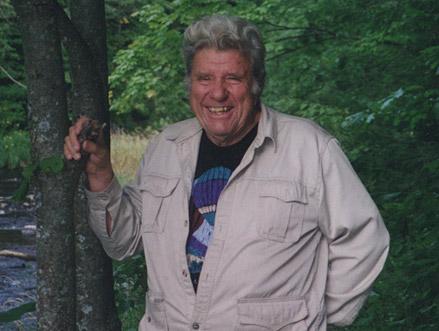
George Spindler, professor of anthropology and education, has died at 94
George Dearborn Spindler, professor emeritus of education and anthropology, died on July 1 in Chapel Hill, North Carolina, at the age of 94.
Spindler founded a new field – the anthropology of education – and revolutionized the teaching of anthropology across the country. At Stanford he was known as a captivating teacher and, with his wife, Louise, taught a popular introductory anthropology course.
Spindler was born in Stevens Point, Wisconsin, on Feb. 28, 1920. He received his bachelor's degree from Central State Teachers College in Wisconsin (now the University of Wisconsin-Stevens Point) and his master's degree in sociology and anthropology from the University of Wisconsin. He then taught high school biology and general science, and later met Louise Schaubel, who would become his wife and collaborator.
The two became a team in the classroom and throughout their research. After completing his service in the U.S. Air Force, Spindler received his doctorate in anthropology, sociology and psychology at the University of California, Los Angeles, in 1952.
At Stanford, Spindler was a professor in both anthropology and education from 1951 to 1978. Even after he retired, he continued to teach and remain a resource for his students.
A team effort
George and Louise Spindler collaborated on their research, writing and teaching for over 50 years. "In the classes they taught together, students received the benefits of the wisdom and humanity of both of them during their lectures, which had an enriching and compounding effect on students," says Arnetha Ball, a professor at the Graduate School of Education.
In an article from 1987, Spindler described their publications together as "trying to communicate that there is one identity involved." Ray McDermott, a professor at the Graduate School of Education, described them as inseparable. All their time was spent on family and work.
Louise Spindler died on Jan. 23, 1997.
By McDermott's estimates, Spindler taught 40,000 students and his introductory texts in anthropology reached millions of students. He taught classes in education, anthropology and sociology. When Spindler taught Anthropology 1 back in 1972, many students in their course reviews said it was one of the best courses that they had taken at Stanford.
Spindler was a storyteller, McDermott recalled. His case-based method of teaching helped scholars realize that the diversity of human culture is a path to understanding the world and ourselves. This allowed anthropology to become relevant to other fields of study, such as education.
Diverse research
Spindler's research focused on the role of schools in the transmission of culture, tying together the fields of anthropology and education. In an interview in 1987 he said, "We are seeing a particular culture not really as outsiders looking in, but as insiders looking in and out at the same time."
Although the overall theme of his research remained the same, the cultures he studied moved with him. In the 1940s, Spindler spent several summers living on the Menominee Indian Reservation in Wisconsin, studying levels of acculturation and its relation to personality traits. He later studied urbanization in Germany and northern Wisconsin schools and Californian cultures.
"The heart of his work was talking to people and writing down what he thought they were all about. He wanted to understand them the way they understood them," McDermott said. Through all his hard work, Spindler maintained a fun, lively personality. He was willing to get teased, as evidenced by the photograph of himself lifting a barbell that he kept on his desk.
"A book should be written about him," Ball said. "He's just a legend. He wrote so much and he impacted so many."
Spindler is survived by his daughter and son-in-law, Sue and Lee Coleman; three granddaughters, Vicki Copeland, Rebecca Walker and Sarah Walker; and six great-grandchildren, Olivia, Alice and Georgia Copeland and Leopold, Augustine and Sebastian Hofweber.
The date and time of Spindler's memorial at Stanford have not yet been announced.



